 First edition | |
| Text | The Coming Victory of Democracy at Internet Archive |
|---|---|
The Coming Victory of Democracy is a book published in 1938 by Alfred A. Knopf, Inc.
 First edition | |
| Text | The Coming Victory of Democracy at Internet Archive |
|---|---|
The Coming Victory of Democracy is a book published in 1938 by Alfred A. Knopf, Inc.
The book contains the abbreviated text of a lecture series delivered by Thomas Mann from February to May in 1938, which was broadcast all over the United States. Mann's intent was to rally support in America for fighting the Nazi regime in Germany. In the text, the German expatriate author explains his moral, political, and artistic reasons for desiring and predicting the victory of democracy over the fascism of his own native country.

Giovanni Pierluigi da Palestrina was an Italian composer of late Renaissance music. The central representative of the Roman School, with Orlande de Lassus and Tomás Luis de Victoria, Palestrina is considered the leading composer of late 16th-century Europe.

Paul Thomas Mann was a German novelist, short story writer, social critic, philanthropist, essayist, and the 1929 Nobel Prize in Literature laureate. His highly symbolic and ironic epic novels and novellas are noted for their insight into the psychology of the artist and the intellectual. His analysis and critique of the European and German soul used modernized versions of German and Biblical stories, as well as the ideas of Johann Wolfgang von Goethe, Friedrich Nietzsche, and Arthur Schopenhauer.

The Nuremberg rallies were a series of celebratory events coordinated by the Nazi Party in Germany. The first Nazi Nuremberg rally took place in 1923. This rally was not particularly large and did not have much impact; however, as the party grew in size, the rallies became more elaborate and featured larger crowds. They played a seminal role in Nazi propaganda events, conveying a unified and strong Germany under Nazi control. The rallies became a national event once Adolf Hitler rose to power in 1933, when they became annual occurrences. Once the Nazi dictatorship was firmly established, the party's propagandists began filming them for a national and international audience. Nazi filmmaker Leni Riefenstahl produced some of her best known work including Triumph of the Will (1934) and The Victory of Faith (1933), both filmed at the Nazi party rally grounds near Nuremberg. The party's 1938 Nuremberg rally celebrated the Anschluss that occurred earlier that year. The 1939 scheduled rally never came to pass and the Nazi regime never held another one as both the government and Nazi Party prioritized Germany's effort in the Second World War over everything else.
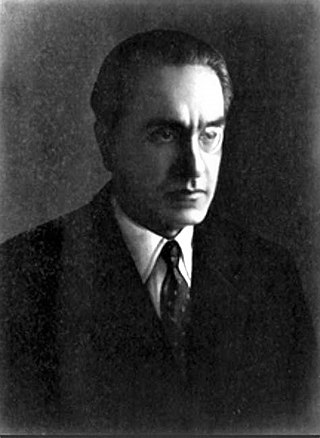
Giulio Cesare Andrea "Julius" Evola was an Italian far-right philosopher. Evola regarded his values as aristocratic, monarchist, masculine, traditionalist, heroic, and defiantly reactionary. An eccentric thinker in Fascist Italy, he also had ties to Nazi Germany; in the post-war era, he was an ideological mentor of the Italian neo-fascist and militant Right.

The Tale of Igor's Campaign or The Tale of Ihor's Campaign is an anonymous epic poem written in the Old East Slavic language. The title is occasionally translated as The Tale of the Campaign of Igor, The Song of Igor's Campaign, The Lay of Igor's Campaign, The Lay of the Host of Igor, and The Lay of the Warfare Waged by Igor.
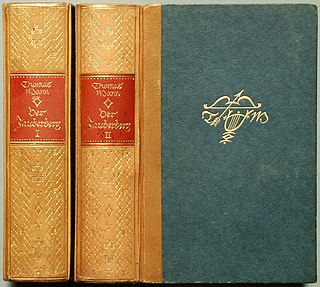
The Magic Mountain is a novel by Thomas Mann, first published in German in November 1924. It is widely considered to be one of the most influential works of twentieth-century German literature.
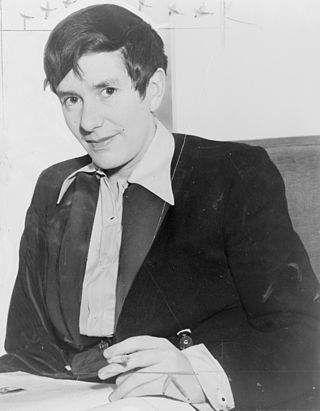
Erika Julia Hedwig Mann was a German actress and writer, daughter of the novelist Thomas Mann.

Gustaf Gründgens, born Gustav Heinrich Arnold Gründgens, was one of Germany's most famous and influential actors of the 20th century, and artistic director of theatres in Berlin, Düsseldorf, and Hamburg. His career continued unimpeded through the years of the Nazi regime; the extent to which this can be considered as deliberate collaboration with the Nazis is hotly disputed.

Helmut Flieg or Hellmuth Fliegel was a German writer, known by his pseudonym Stefan Heym. He lived in the United States and trained at Camp Ritchie, making him one of the Ritchie Boys of World War II. In 1952, he returned to his home to the part of his native Germany which was, from 1949 to 1990, the German Democratic Republic. He published works in English and German at home and abroad, and despite longstanding criticism of the GDR remained a committed socialist. He was awarded the 1953 Heinrich Mann Prize, the 1959 National Prize of East Germany, and the 1993 Jerusalem Prize.
The Conservative Revolution, also known as the German neoconservative movement, or new nationalism, was a German national-conservative movement prominent during the Weimar Republic and Austria, in the years 1918–1933.
Michael Mann FBA is a British-born emeritus professor of sociology at the University of California, Los Angeles (UCLA) and at the University of Cambridge. Mann holds dual British and United States citizenships.

Doctor Faustus is a German novel written by Thomas Mann, begun in 1943 and published in 1947 as Doktor Faustus: Das Leben des deutschen Tonsetzers Adrian Leverkühn, erzählt von einem Freunde.

Ludwig Heinrich Edler von Mises was a Ukraine-born Austrian–American Austrian School economist, historian, logician, and sociologist. Mises wrote and lectured extensively on the societal contributions of classical liberalism and the power of consumers. He is best known for his work on praxeology studies comparing communism and capitalism.

Not Without My Husband is a book written by Justine Harun-Mahdavi. The book is the memoir of Justine and her life as a German woman with her Persian (Iranian) husband, Masoud Harun-Mahdavi, in Iran before and after the 1979 Iranian Revolution. It responds to the negative account of Iran in Betty Mahmoody's bestselling 1987 memoir, Not Without My Daughter.

The Nazi book burnings were a campaign conducted by the German Student Union to ceremonially burn books in Nazi Germany and Austria in the 1930s. The books targeted for burning were those viewed as being subversive or as representing ideologies opposed to Nazism. These included books written by Jewish, half-Jewish, communist, socialist, anarchist, liberal, pacifist, and sexologist authors among others. The initial books burned were those of Karl Marx and Karl Kautsky, but came to include very many authors, including Albert Einstein, Helen Keller, writers in French and English, and effectively any book incompatible with Nazi ideology. In a campaign of cultural genocide, books were also burned en masse by the Nazis in occupied territories, such as in Poland.
German Exilliteratur is the name for works of German literature written in the German diaspora by refugee authors who fled from Nazi Germany, Nazi Austria, and the occupied territories between 1933 and 1945. These dissident writers, poets and artists, many of whom were of Jewish ancestry or held anti-Nazi beliefs, fled into exile in 1933 after the Nazi Party came to power in Germany and after Nazi Germany annexed Austria by the Anschluss in 1938, abolished the freedom of press, and started to prosecute authors and ban works.

Psalm 41 is the 41st psalm of the Book of Psalms, beginning in English in the King James Version: "Blessed is he that considereth the poor". In the slightly different numbering system used in the Greek Septuagint version of the bible, and generally in its Latin translations, this psalm is Psalm 40. In the Vulgate, it begins "Beatus qui intellegit super egenum et pauperem". The final psalm in Book One of the collection, it is attributed to King David.
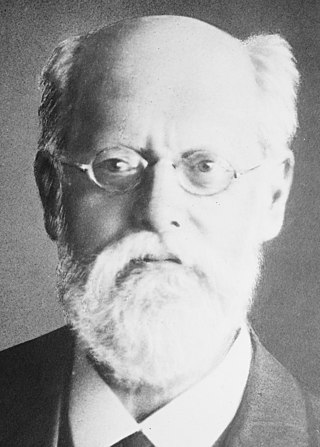
Karl Johann Kautsky was a Czech-Austrian philosopher, journalist, and Marxist theorist. A leading theorist of the Social Democratic Party of Germany (SPD) and the Second International, Kautsky advocated orthodox Marxism, which emphasized the scientific, materialist, and determinist character of Karl Marx's work. This interpretation dominated European Marxism for two decades, from the death of Friedrich Engels in 1895 to the outbreak of World War I in 1914.
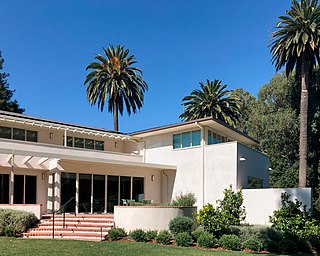
The Thomas Mann House in Pacific Palisades, Los Angeles, in the U.S. state of California is the former residence of Nobel Prize laureate Thomas Mann, who lived there with his family during his exile from 1942 until 1952. Designed by the architect Julius Ralph Davidson, the house at 1550 San Remo Drive was built in 1941/42. In 2016, it was acquired by the German federal government, and opened on June 18, 2018 as a place for transatlantic dialogue and debate.
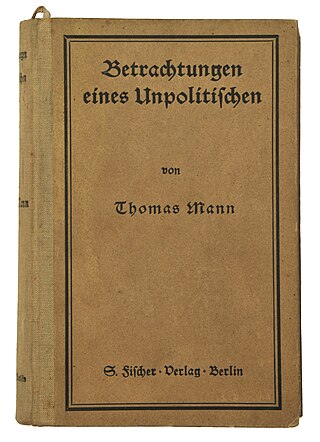
The Reflections of a Nonpolitical Man is a non-fiction work by German author Thomas Mann published in 1918. Unlike his brother Heinrich, Thomas Mann supported the German war effort during World War I. The book, which runs to almost six hundred pages, defends the authoritarianism and "culture" of Germany against the "civilization" of the West. It served to justify and distinguish his conservative political stance from that of his more liberally oriented brother.